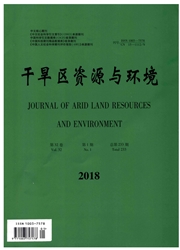

 中文摘要:
中文摘要:
在我国工业化建设中,农民工已成为工人阶层的重要组成部分。其中,女性农民工所占比例已达三分之一,其外出务工过程中出现了大量问题。因此,这一群体的行为空间引起了学术界的广泛关注。由于社会、家庭和自身等因素,我国女性农民工务工行为空间面临着大量亟需研究的新课题。基于地理学的行为空间理论,以河南省9个样本村为实证对象,通过问卷调查及实地访谈方式,探究女性农民工外出务工空间的偏好特征及其影响因素。主要研究结论有:(1)女性农民工的自身特征、家庭特征会影响到她们的务工空间偏好;(2)女性务工目的地的分布上具有群聚特征:整体分散,局部集中;(3)女性务工人数随务工距离的分布具有前端集中、后端波浪变化的"L"型分布特点;(4)女性务工体验行为也在不断变化,其满意度一般开始时增加,到了一定的阶段又开始减少,呈倒"V"字型。这些研究结论将为政府部门提供女性农民工外出务工空间偏好的相关数据并提出可行性建议,有助于政府对此制定切实有效的政策。
 英文摘要:
英文摘要:
As industrialization and urbanization have been processing in China,rural migrant workers have become an important part of the working class,one third of whom are female migrants.Consequently,a lot of social problems appear.Therefore,behavioral spatial characteristics of female migrants have caused wide attention in academia.Due to the social,family and personal factors,the research on employment space and career preferences of female migrants is becoming more and more important in our society.Based on the behavioral space theory,with nine sample villages in Henan province,through the way of questionnaire and on-the-spot interviews,the paper explores spatial preference laws and influencing factors of the female migrant workers in Henan province.The main conclusions are as follows:(1)The individual and family characteristics of female migrants have effect on choosing job location and employment space;(2)The employment destination has the characteristics of the overall dispersion and local concentration;(3)The distribution of employment along with the change of distance is of " L" shape;(4)Their experience behaviors are constantly changing- say,their satisfaction increasing at the initial stage and changing to decrease afterwards,presenting a reverse V-shape.The main conclusions are useful for the government and worth referring to effective policies on female migrants.
 同期刊论文项目
同期刊论文项目
 同项目期刊论文
同项目期刊论文
 期刊信息
期刊信息
